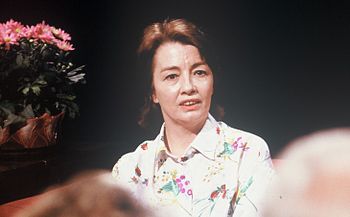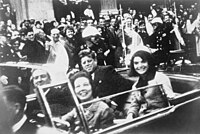The 1960s Portal
The 1960s became synonymous with the new, radical, and subversive events and trends of the period. In Africa the 1960s was a period of radical political change as 32 countriesgained independence from their European colonial rulers. Some commentators have seen in this era a classicalJungiannightmare cycle, where a rigid culture, unable to contain the demands for greaterindividual freedom,broke free of the social constraints of the previous age through extreme deviation from the norm.Christopher Bookercharts the rise, success, fall/nightmare and explosion in the London scene of the 1960s. However, this alone does not explain the mass nature of the phenomenon. Several nations such as the U.S., France, Germany and Britain turned to theleftin the early and mid 1960s. In the United States,John F. Kennedy,aKeynesianand staunchanti-communist,pushed for social reforms. His assassination in 1963 was a stunning shock. Liberal reforms were finally passed underLyndon B. Johnsonincluding civil rights forAfrican Americansand healthcare forthe elderlyandthe poor.Despite his large-scaleGreat Societyprograms, Johnson was increasingly reviled by theNew Leftat home and abroad. The heavy-handed American role in theVietnam Waroutraged student protestors across the globe, as they found peasant rebellion typified byHo Chi MinhandChe Guevaramore appealing. Italy formed its first left-of-center government in March 1962 with a coalition ofChristian Democrats,Social Democrats,and moderateRepublicans.Socialistsjoined the ruling block in December 1963. In Britain, theLabour Partygained power in 1964. In Brazil,João Goulartbecame president afterJânio Quadrosresigned. This is aFeatured article,which represents some of the best content on English Wikipedia..
TheCoinage Act of 1965,Pub. L.89–81,79Stat.254,enactedJuly 23, 1965,eliminatedsilverfrom the circulating United Statesdime(ten-cent piece) andquarter dollarcoins. It also reduced the silver content of thehalf dollarfrom 90 percent to 40 percent; silver in the half dollar was subsequently eliminated by a 1970 law. There had been coin shortages beginning in 1959, and theUnited States Bureau of the Mintexpanded production to try to meet demand. The early 1960s was a time of increased use of silver both in the coinage and inindustry,putting pressure on the price of silver, which was capped at just over $1.29 per ounce by government sales at that price. The silver in a dollar's worth of quarters would be worth more asbullionthan as money if the price of the metal rose past $1.38 per ounce, and there was widespread hoarding of silver coins. Demand for theKennedy half dollaras a collectable drove it from circulation after its debut in 1964. The Bureau of the Mint increased production, helping reduce the coin shortages by May 1965, but government stocks of silver were being rapidly reduced, and threatened to run out by 1968. After extensive study by theTreasury Department,PresidentLyndon B. Johnsonin June 1965 recommended that Congress pass legislation to allow for silverless dimes and quarters, anddebasedsilver half dollars. Although there was some opposition, mainly from legislators representing Western mining states, the bill progressed rapidly through Congress, and was enacted with Johnson's signature on July 23, 1965. (Full article...)This is aGood article,an article that meets a core set of high editorial standards.
The English rock groupthe BeatlestouredWest Germany,Japanand thePhilippinesbetween 24June and 4July 1966. The thirteen concerts comprised the first stage of a world tour that ended with the band'sfinal tour of the United States,in August 1966. The shows in West Germany represented a return to the country where the Beatles haddeveloped as a groupbefore achieving fame in 1963. The return flight from the Philippines to England included a stopover inDelhi,India.There, the Beatles indulged in two days of sightseeing and shopping for musical instruments while still under the attention of the press and local fans. The concerts were well attended yet provided the band with little in the way of artistic fulfilment. The programme was in the package-tour format typical of the 1960s, with two shows per day, several support acts on the bill and the Beatles' set lasting around 30 minutes. The band's setlist included their new single, "Paperback Writer",but no songs from their recently completed album,Revolver.Often marked by poor playing, the shows highlighted the division between what the group could achieve when performing live as a four-piece with inadequate amplification and the more complex music they were able to create in the recording studio. Concerts at theCircus-Krone-BauinMunichand theNippon Budokanhall inTokyowere filmed and broadcast on local television networks. (Full article...)Selected picture - Christine Keeler,best known for her involvement in theProfumo Affair,which lead to the resignation of British Prime MinisterHarold Macmillan.
Did you know -
Related portalsThis is aFeatured article,which represents some of the best content on English Wikipedia..
George HarrisonMBE(25 February 1943 – 29 November 2001) was an English musician, singer and songwriter who achieved international fame as the lead guitarist ofthe Beatles.Sometimes called "the quiet Beatle", Harrison embracedIndian cultureand helped broaden the scope ofpopular musicthrough his incorporation of Indian instrumentation andHindu-aligned spirituality in the Beatles' work. Although the majority of the band's songs were written byJohn Lennon and Paul McCartney,most Beatles albums from 1965 onwards contained at least two Harrison compositions. His songs for the group include "Taxman","Within You Without You","While My Guitar Gently Weeps","Here Comes the Sun"and"Something".Harrison's earliest musical influences includedGeorge FormbyandDjango Reinhardt;subsequent influences wereCarl Perkins,Chet AtkinsandChuck Berry.By 1965, he had begun to lead the Beatles intofolk rockthrough his interest inBob Dylanandthe Byrds,and towardsIndian classical musicthrough his use of Indian instruments, such as thesitar,which he had become acquainted with on the set of the filmHelp!He played sitar on numerous Beatles songs, starting with "Norwegian Wood (This Bird Has Flown)".Having initiated the band's embrace ofTranscendental Meditationin 1967, he subsequently developed an association with theHare Krishna movement.(Full article...)This is aGood article,an article that meets a core set of high editorial standards.
Félix Houphouët-Boigny(French:[feliksufwɛ(t)bwaɲi];18 October 1905 – 7 December 1993), affectionately calledPapa HouphouëtorLe Vieux( "The Old One" ), was an Ivorian politician and physician who served as the firstpresidentofIvory Coastfrom 1960 until his death in 1993. Atribal chief,he worked as a medical aide, union leader, and planter before being elected to theFrench Parliament.He served in several ministerial positions within theFrench governmentbefore leading Ivory Coast following independence in 1960. Throughout his life, he played a significant role in politics and thedecolonisation of Africa. Under Houphouët-Boigny's politicallymoderateleadership, Ivory Coast prospered economically. This success, uncommon in poverty-ridden West Africa, became known as the "Ivorian miracle"; it was due to a combination of sound planning, the maintenance of strong ties with the West (particularly France) and development of the country's significant coffee and cocoa industries. However, reliance on the agricultural sector caused difficulties in 1980, after a sharp drop in the prices of coffee and cocoa. (Full article...)
Selected article - This article includes an overview of the events and trends inpopular musicin the1960s. InNorth AmericaandEuropethe decade was particularly revolutionary in terms ofpopular music,continuing the shift away fromtraditional popthat began in the1950s.The 1960s saw the evolution ofrockand the beginnings of thealbum era.At the beginning of the 1960s,popandrock and rolltrends of the 1950s continued; nevertheless, the rock and roll of the decade before started to merge into a more international, electric variant. In the mid-1960s, rock and roll in its purest form was gradually overtaken bypop rock,beat,psychedelic rock,blues rock,andfolk rock,which had grown in popularity. Thecountry- andfolk-influenced style associated with the latter half of 1960s rock music spawned a generation of popularsinger-songwriterswho wrote and performed their own work. Towards the decade's end, genres such asBaroque pop,sunshine pop,bubble gum pop,andprogressive rockstarted to grow popular, with the latter two finding greater success in the following decade. Furthermore, the 1960s sawfunkandsoul musicrising in popularity;rhythm and bluesin general remained popular. The fusion of R&B,gospel,and original rock and roll was a success until the mid-part of the decade. Aside from the popularity of rock and R&B music in the 1960s,Latin Americanas well asJamaicanandCubanmusic achieved a degree of popularity throughout the decade, with genres such asBoss a nova,thecha-cha-cha,ska,andcalypsobeing popular. From aclassicalpoint of view, the 1960s were also an important decade as they saw the development ofelectronic, experimental,jazzandcontemporary classical music,notablyminimalismandfree improvisation.(Full article...)More Did you know(auto generated)
TopicsCategoriesWikiProjects
Associated WikimediaThe followingWikimedia Foundationsister projects provide more on this subject:
Discover Wikipedia usingportals |




























